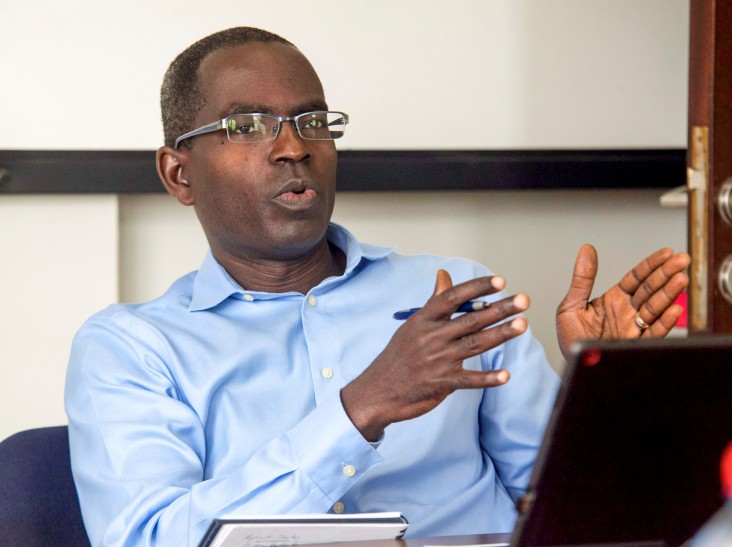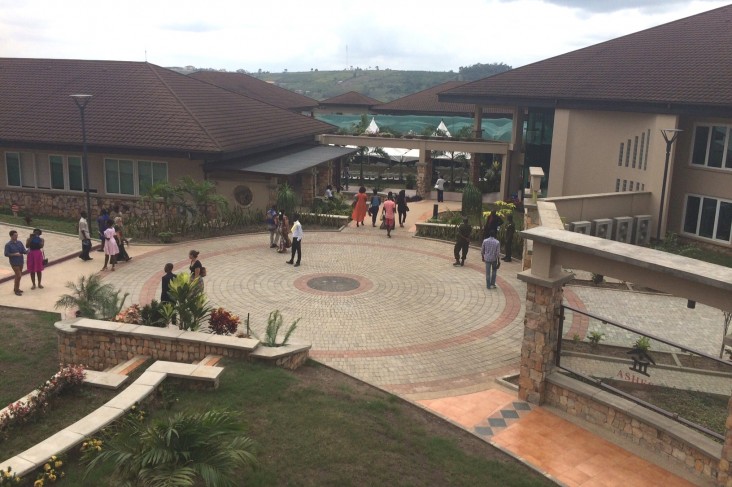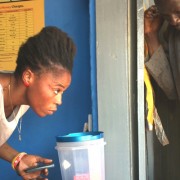 Ashesi University’s honor code
Ashesi University
Ashesi University’s honor code
Ashesi University
 Ashesi University’s honor code
Ashesi University
Ashesi University’s honor code
Ashesi University
Patrick Awuah left a lucrative job at Microsoft in 1997 to found Ashesi University in Ghana. By 2002, the school opened its doors with Awuah as its president.
Today Ashesi has become a highly respected organization in Ghana and a top-10 university in Africa. Ashesi offers undergraduate degrees ranging from business administration to engineering taught with a liberal arts perspective, and currently enrolls 679 students from 22 countries.
In 2015, Awuah was ranked by Fortune magazine as one of the world’s 50 greatest leaders and was named a 2015 MacArthur Foundation Fellow (link is external). Since 2010, Ashesi has received three awards from the USAID Office of American Schools and Hospitals Abroad (ASHA) to purchase equipment for classrooms and the library, help construct the building that houses Ashesi’s new engineering program, and purchase equipment and technology for its science and engineering laboratories, classrooms and workshop.
FrontLines: What motivated you to leave a successful business career at Microsoft to establish Ashesi University (link is external) in Ghana?
Patrick Awuah: The birth of my first child caused me to think deeply about the world we should leave for future generations. I was especially concerned that future generations of Africans would not inherit a stable, prosperous continent.
My first thought was to return to Ghana (from the United States) to set up a software company that would contribute to economic growth. I was awed by the fact that Microsoft (where I worked at the time) had grown its annual revenues to exceed the GDP of Ghana. My plans to set up a software company were dashed when I discovered that university students studying computer science and allied subjects in Ghana were not using computers at all. They wrote code on paper, got grades and eventually graduated with bachelor degrees in computer science or computer engineering! There was such an obvious deficit of human capital that it seemed to me that I could not successfully establish a software company in Ghana.
I eventually decided to establish a university because I realized that one of the most fundamental problems in Ghana (and more broadly in Africa) was the problem of poor leadership—a problem that I felt could be solved by changing the way leaders were educated.
At the time, only 5 percent of college-aged people in Ghana attended college. So by definition, the students in Ghana’s polytechnics, colleges and universities would be the leaders in the future. I believed that if these future leaders could be educated to be ethical, to think critically, and to solve problems, then in 20 to 30 years, we would see a fundamental change in the fabric of African leadership.
It was a vision that was exciting enough to inspire me to leave Microsoft.
FrontLines: What did you see in terms of needs and unmet demand that pushed you to build an institution of higher education in Africa?
Awuah: During the planning stage for Ashesi University, we spent a significant amount of time talking to business leaders, social service leaders, physicians, leaders of faith-based organizations and even the military. They all agreed that the single biggest deficit in Ghanaian higher education was the quality of graduates. They listed the following key deficits: integrity, communication skills, problem-solving skills and the ability to work in teams. The list was almost always in that order, regardless of who we spoke with. They were frustrated that university graduates were not curious or able to deal with ambiguity.
FrontLines: What from your own personal American education experience did you bring to the character of this institution?
Awuah: My experience as a student at Swarthmore College (link is external), where I studied engineering and economics in a liberal arts setting, had demonstrated to me the power of a liberal education. My experience at Swarthmore completely changed my understanding of what a good education is. Before then, I had only known rote memorization as the model for education. I knew that the model of the liberal arts and sciences was an excellent way to address the educational problems that we identified during our focus group interviews with Ghanaian leaders.
FrontLines: Building on your 13-year experience, what makes Ashesi stand out from other universities in Africa, and why would a bright and motivated student choose Ashesi?
Awuah: Ashesi stands out in a number of ways: small class sizes; the broad learning and analytical rigor that form the essence of the liberal arts; a student-centered learning environment; and a deep commitment to diversity and inclusion.
The results have been exceptional. Our students instituted the first honor system on a university campus in Africa and have inspired two high schools to implement similar systems. We have consistently achieved over 90 percent job placement within three months after students graduate and 100 percent placement within six months. Over 90 percent of our graduates stay to work for progress in Africa.
FrontLines: What is your future vision for Ashesi and what is your greatest hope for its graduates?
Awuah: We plan to grow to 2,000 students, add majors that directly prepare students for careers in public service, add graduate programs and explore ways to scale our impact across Africa. I look forward to seeing Ashesi alumni leading some of Africa’s most important corporations and serving at the highest levels in government.
FrontLines: What role did USAID/ASHA play in the growth of Ashesi University?
Awuah: USAID/ASHA support helped to equip and furnish our library and classrooms when we moved to our permanent campus in 2011. This funding continues to provide a rich, high-quality learning environment for our students. Support from ASHA has also been instrumental in establishing a new engineering major at Ashesi. In 2013, we received funding towards the construction of the engineering facility, which was completed on budget and on time, and will allow Ashesi to enroll more students from across Africa. USAID/ASHA grant funding will expose Ashesi students to a rich engineering education on par with top U.S. universities, empowering them to compete on a global level.
FrontLines: What advice do you have for other African universities to encourage their graduates to return to work and live on continent?
Awuah: My advice is, first, it is important to have a continuing conversation with students about their responsibilities to their continent. Second, it is necessary to implement pedagogical approaches that prepare students appropriately, and also develop strong career placement offices that help students find good jobs on the continent. Infusing the right knowledge, skill-set and character development in university education systems across the continent will dramatically increase retention of Africa’s brightest young professionals.
FrontLines: On a personal note, USAID/ASHA extends its congratulations to you for receiving the MacArthur Foundation award this year. What does it mean to you personally to be named a 2015 MacArthur Foundation Fellow and how do you think this prestigious award will affect both you and Ashesi going forward?
Awuah: The MacArthur Award is a very big honor. I am thrilled and humbled by the award, and I feel a depth of gratitude towards the many people and organizations whose support and work have made Ashesi what it is. The award is a great validator for Ashesi, and has energized support for our work. I hope it will encourage other African universities to look at Ashesi’s model.














Comment
Make a general inquiry or suggest an improvement.